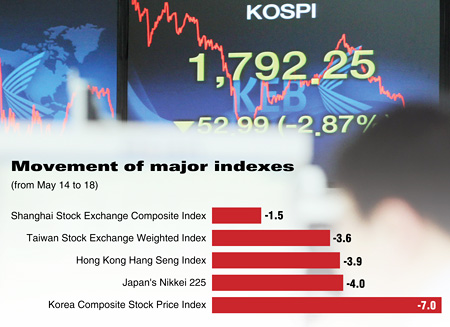Shaky financial market
 KOSPI dips below 1800 on Europe worries
KOSPI dips below 1800 on Europe worries
This week was a nightmare for Korea’s financial markets, which fell sharply due to renewed fears over another economic downturn fueled by the Greek crisis. In the coming weeks, investors are expected to go through a roller coaster ride.
The Korea Composite Stock Price Index (KOSPI) sank further below the psychologically-important 1,800 mark Friday to end at 1782.46. It was the first time for it to drop under that point since Dec. 20 last year.
The shares followed U.S. stocks, which closed lower Thursday due to discouraging U.S. economic reports as well as worries about the instability of the eurozone.
The value of the won also fell to 1,172.80 against the dollar at the end of Friday’s session, the lowest level since Dec. 20.
All major indexes in the Asian stock market dived this week due to refreshed fears over the eurozone crisis, although they gained a little on Thursday, but the Korean financial market seems to be hit harder than others on the continent.
Japan’s Nikkei 225 dropped 4.0 percent to 8611.31 Friday from 8973.84 on Monday, and the Hong Kong Hang Seng Index plunged 3.9 percent. The Shanghai Stock Exchange Composite Index dropped only 1.5 percent.
But the KOSPI showed the biggest drop of 7.02 percent, or 134.67 points, from Monday, largely led by foreign capital flight.
Offshore investors pulled out of the market for the 13th consecutive session, dumping about 1.3 trillion won worth of shares this week alone, eroding the market quickly.
Vulnerability
The question is why is the Korean market more vulnerable to external factors than other countries? Should there be measures to protect the market and investors?
Experts cited the country’s export-dependent economy and relatively open financial market to foreign investors as the main reasons behind the repeated volatility.
But the government has repeatedly downplayed the impact of the current Greek crisis on the domestic financial market and economy, saying the country will show a quicker recovery from damage than other countries.
“Korea tends to be more sensitive,” Bank of Korea (BOK) Governor Kim Choong-soo said Friday during a meeting with presidents of local banks. “As our financial market is more open, it responds sensitively at first but bounces back quickly.”
Some government officials even argue the vulnerability is a positive indicator to show the market’s transparency and openness.
“I think this is actually a good sign in a way, to show our financial market is transparent,” said Choi Yong-ho, director of the market analysis division at the Financial Service Commission (FSC). “Although it is easier for foreign investors to withdraw their investments here and that leads the market to tumble drastically sometimes, there are also benefits from their active participation in the market and economy, which should not be neglected.”
But he said to cope with massive capital flight, the authorities try to increase the foreign currency reserves and closely monitor the liquidity level at lenders. “We’re all ready to deal with emergency situations through such measures as currency swaps.”
But experts point out that the authorities should tighten the regulations on short-term speculative investment by foreigners as a move to stabilize and protect the market.
Lee Jun-hyuck, a senior researcher at Hyundai Research Institute, said the Korean market has become stronger and more stable after going through a series of financial crises, directly in the late 1990s and indirectly in the late 2000s, but it is still vulnerable so it needs protection.
“To minimize the impact of external factors, I think there should be at least regulations on short-term speculative investment, which has nothing to do with the real economy,” Lee said.
There are even some people who strongly demand stricter regulations to protect the financial market.
Choi Pae-kun, an economics professor at Konkuk University, strongly criticized the government for its lack of will to protect the economy, which he said has been severely damaged by foreign investors.
“The country is now seen as an ATM (automated teller machine) for foreigners as they withdraw money from the Seoul bourse whenever they want and leave the nation,” he said. “The market is very attractive to them given high earnings rates and an easy liquidation process.”
Without any substantial proof to show that foreign investors contribute to the Korean economy, it is wrong to allow them to take advantage of the market, he said.
“I’m not saying we should go back to the past and close the door, but the financial authorities should do their job when there are problems they need to tackle,” he said.
But many market insiders do not seem to agree with stricter regulation, citing it only turns away investors and has a negative impact on the market.
“The market has not grown up fully yet,” said Kwak Joong-bo, an analyst at Samsung Securities. “Maybe it is part of the growing process. So the solution is not to shut the door, because then we also cannot get out.” <Korea Times/Kim Tae-jong>





















































